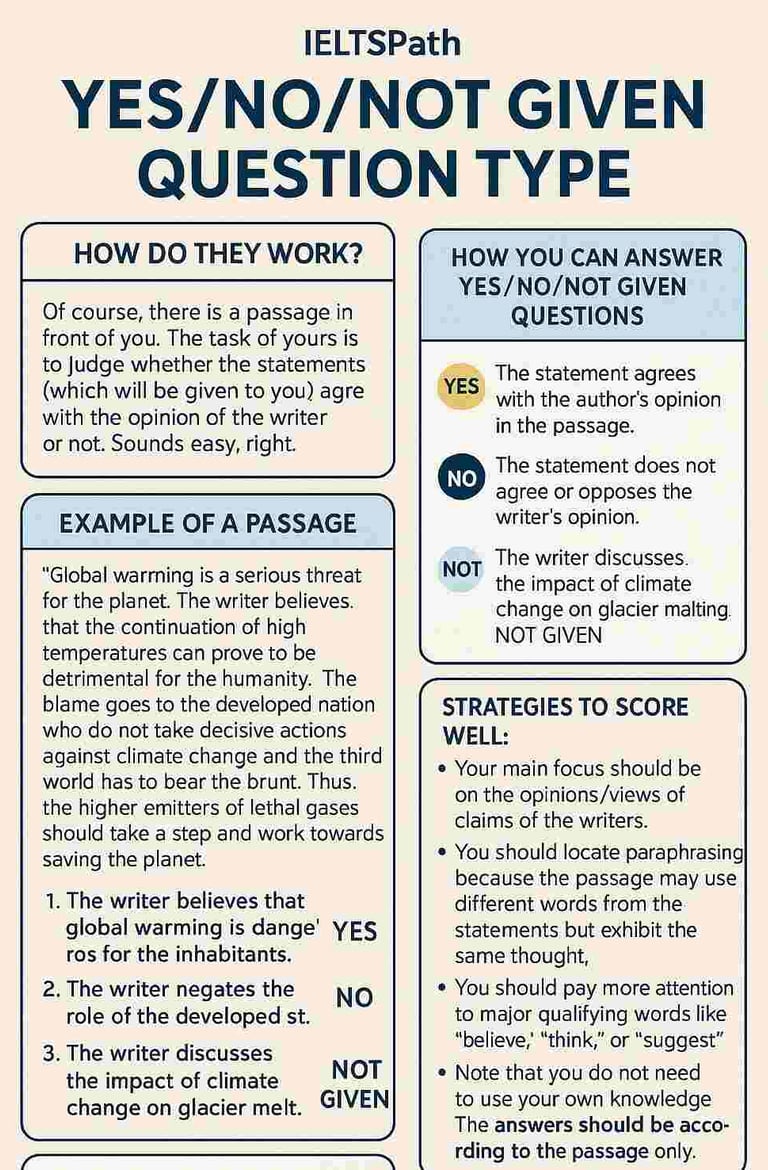IELTS Reading – Yes/No/Not Given Guide with Practice, Tips & Strategies
Learn how to solve Yes/No/Not Given questions in the IELTS Reading test. This guide includes key strategies, common mistakes to avoid, helpful tips, and interactive practice questions to improve your score.
READING
4/15/20252 min read


✅ Yes/No/Not Given Question Type
We have experienced a similar question type in the form of True/False questions where we focus on giving a factual answer. However, Yes/No questions are slightly different in nature.
❓ HOW DO THEY WORK?
Of course, there is a passage in front of you. Your task is to judge whether the statements (which will be given to you) agree with the opinion of the writer or not. Sounds easy, right?
You read the passage (which gives you a certain opinion of the writer), then read the statements and see if those statements agree with the writer or not.
🧠 How You Can Answer Yes/No/Not Given Questions
✅ YES: The statement agrees with the author’s opinion in the passage.
❌ NO: The statement does not agree or opposes the writer’s opinion.
❔ NOT GIVEN: The passage does not provide sufficient information to say whether the statement agrees with the writer or not.
📘 EXAMPLE OF A PASSAGE
“Global warming is a serious threat for the planet. The writer believes that the continuation of high temperatures can prove to be detrimental for humanity. The blame goes to the developed nations who do not take decisive actions against climate change and the third world has to bear the brunt. Thus, the higher emitters of lethal gases should take a step and work towards saving the planet.”
STATEMENTS
1️⃣ The writer believes that global warming is dangerous for the inhabitants of Earth. → ✅ YES
2️⃣ The writer negates the role of the developed states in increasing climate. → ❌ NO
3️⃣ The writer discusses the impact of climate change on glacier melting. → ❔ NOT GIVEN
📗 EXAMPLE OF ANOTHER PASSAGE
“I belong to a poor family in a district of Punjab. I am the only daughter with two brothers. Both of my brothers go to school while I am forced to stay at home and help my mother in household chores. I believe that education is the right of every individual and I am being denied of that important right. The credit also goes to poverty that my father is unable to pay the fee of three children, so he chooses me to stay.”
STATEMENTS
1️⃣ The author thinks that education is the basic right of all. → ✅ YES
2️⃣ The author does not blame poverty for the neglect of her education. → ❌ NO
3️⃣ The author claims to become a doctor when she grows up. → ❔ NOT GIVEN
🎯 STRATEGIES TO SCORE WELL:
🔍 Focus on the opinions of the writer, not just facts.
🌀 Look for paraphrasing because the passage may use different words from the statements but express the same thought.
✨ Pay attention to major qualifying words like believe, think, or suggest, as these reflect the author's opinion and help in choosing the correct answer.
🚫 Do not use your own knowledge. The answers should be based on the passage only.
📛 REMEMBER that answers must be exactly YES, NO, or NOT GIVEN (not True/False), as using the wrong format can lower your score.
💡 A QUICK REMINDER
Yes/No questions focus on the opinions/views or claims of the writer.
True/False/Not given questions focus on factual information and details related to facts in the passage.
🎯 Now is your time to practice such questions in the sample IELTS reading section!
Resources
SUPPORT
+923184813655
© 2025. All rights reserved.
📍 RTS (Rise To Succeed), Near Erum Bright Academy, Daro Road, Dadu
